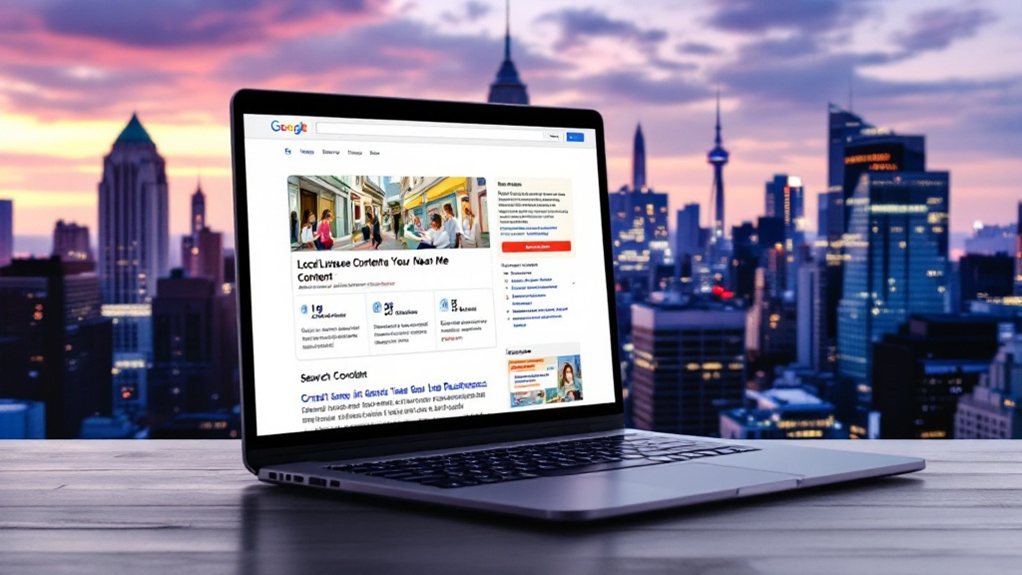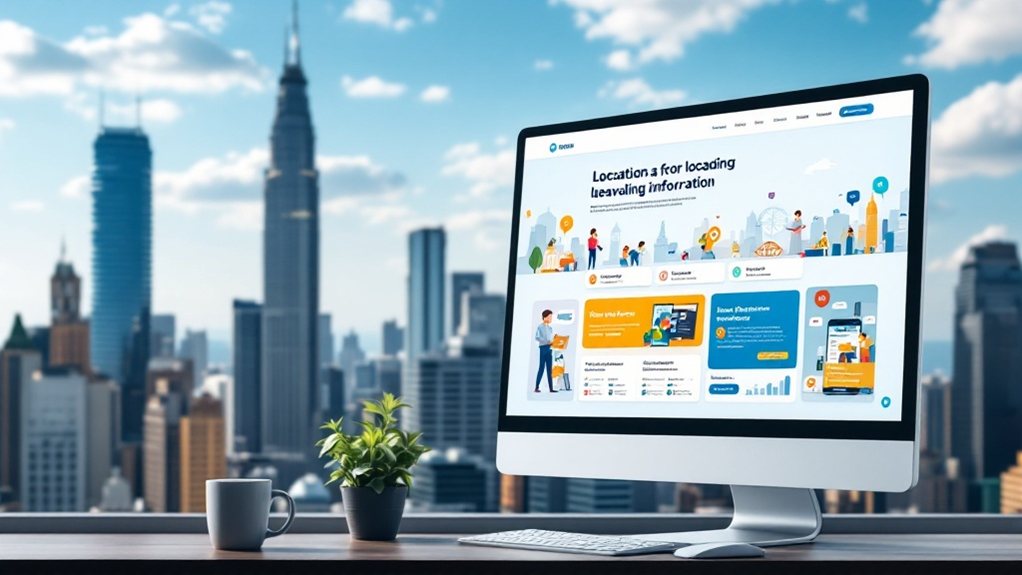To write city-specific landing pages that rank well for 'near me' searches, you must first identify your target audience. Craft unique, relevant content tailored to their preferences and pain points. Incorporate local relevance through community involvement, customer testimonials, and location-specific visuals. Optimize for local keywords in titles, descriptions, and content. Leverage eye-catching multimedia to enhance the user experience. Following these steps will help you create compelling city-specific pages that drive conversions – and there's more you can do to further improve your results.
Identifying Your Target Audience

Identifying your target audience is crucial for crafting effective city-specific landing pages. Consider the age, location, gender, occupation, and income level of your potential customers. Understanding their psychographics, such as spending behavior, values, interests, and pain points, can also inform your content and messaging. Analyzing competitor audiences can help you determine the competitive advantage. Analyze industry trends, competitor strategies, and market needs to ensure your product or service aligns with your target audience. Leverage customer data from surveys, interviews, purchase history, and engagement metrics to refine your understanding. With this comprehensive view of your audience, you can create landing pages that resonate and drive conversions.
Crafting Unique and Relevant Content

Crafting unique and relevant content is crucial for city-specific landing pages. You'll need to tailor your approach, structure your pages uniquely, and optimize local elements to stand out in 'near me' searches. City pages are an important component of local SEO strategies by helping establish visibility in nearby cities where no physical locations exist. By following these principles, you can create content that resonates with your target audience and boosts your local visibility.
Tailored Content Approach
Oftentimes, crafting tailored content is the key to unlocking the full potential of your landing pages. By incorporating local keywords, leveraging localized ad copy, and developing a content strategy that targets specific geographic areas, you can effectively attract relevant traffic and build trust with your local audience. Personalizing content to address the unique needs and pain points of your buyer personas can significantly boost engagement and conversions. Additionally, aligning your content with the preferences of your target personas, while adapting the language and messaging to their preferences, can further enhance user relevance.
- Optimize for location-specific queries with local keywords
- Enhance user relevance through localized ad copy and community involvement
- Personalize content to address the pain points of your target personas
Unique Page Structures
When crafting unique and relevant content for your city-specific landing pages, you'll want to incorporate a flexible layout that keeps users engaged. Use a mix of text and multimedia elements, like city-specific infographics, to highlight local data. Employ different call-to-action (CTA) buttons based on the user's local search intent, and embed Google Maps to show business locations. Incorporate relevant customer testimonials to build trust. Additionally, cover local events, landmarks, and transportation options to provide valuable information to your audience. Optimized location pages are key to improving search rankings and local visibility. Optimize for user intent by using location-specific keywords and creating comparison guides or FAQs tailored to local needs. Utilize responsive design and interactive elements to enhance the user experience.
Optimized Local Elements
Optimizing local elements is key when crafting unique and relevant content for your city-specific landing pages. Incorporate localized keywords in your titles, meta descriptions, headings, and content to ensure alignment with local searches. Utilize tools like Google Keyword Planner to uncover geo-targeted keywords with high search volume and focus on phrases that include neighborhood names or local terminology for enhanced relevance. Moreover, develop location-specific content such as:
- Blog posts and guides relevant to the industry and area
- Highlights of local awards, staff, or events
- "Top 10" lists or articles about local activities
Providing relevant, targeted content can improve the user experience and build trust with potential customers. Optimized local elements will boost your visibility in 'near me' search results.
Incorporating Local Relevance

Incorporating local relevance is key to creating city-specific landing pages that resonate with your target audience. Highlight your community involvement, showcase local success stories, and incorporate customer testimonials from your region. Use geo-relevant visuals to establish a strong connection with your local market. Ensure your pages are responsive and provide clear calls-to-action to drive conversions.
Enhance Local Relevance | Build Trust with Locals
— | —
Community Engagement | Local Social Proof
Regional Case Studies | Community Involvement Stories
Local Customer Testimonials | Awards and Recognition
Leveraging local data and trends can further differentiate your offer. Analyze search patterns, incorporate local dialect, and create seasonal content to showcase your expertise and appeal to your target audience. [Providing targeted, location-specific content can be a powerful way to connect with your local audience.
Optimizing for Local Keywords
Optimizing for local keywords is key to boosting visibility in "near me" searches. Start by using tools like Google Keyword Planner and Ahrefs to identify high-priority keywords based on metrics like search volume and keyword difficulty. Then, strategically incorporate these local terms throughout your website content, from title tags to internal links. Effective local SEO ensures business appears at the top for local searches.
Identify Relevant Keywords
When optimizing your content for local search, you'll first want to identify the most relevant keywords for your business and target audience. This means uncovering long-tail keywords, geo-targeted phrases, and analyzing keyword difficulty to prioritize achievable options. Keyword research is a map, showing where to aim content efforts to get results. Utilize keyword research tools like:
- Google Keyword Planner to uncover location-specific search terms
- SEMrush or Ahrefs for comprehensive competitive analysis
- Long-tail keyword generators to create hyper-targeted phrases
Optimize Keyword Placements
How do you ensure your target keywords are effectively placed throughout your city-specific landing pages? Optimize your title tags by incorporating local keywords like "Top Dentists in New York City" to attract 'near me' searches. Likewise, include location-specific keywords in meta descriptions to entice users and boost click-through rates. Use keywords naturally without overusing them, and prioritize high-volume local search terms. Align your keywords across titles, meta descriptions, and content for consistent ranking. Furthermore, employ a clear, keyword-rich URL structure, such as "/new-york-city-dentists," and leverage schema markup to provide additional location details. Incorporate local keywords in image alt tags to improve your local search visibility. By strategically placing your target keywords, you can improve your local search visibility and attract more qualified, city-specific traffic.
Leveraging Visual Elements
Visuals can be a powerful tool in crafting city-specific landing pages. By incorporating images of local landmarks, high-quality photography, and custom maps, you can create a sense of familiarity and engagement for your visitors. Additionally, consider using video tours or 360-degree views to provide an immersive experience. Highlighting unique elements or differences between business locations can help showcase the diversity of services offered in different areas.
Ensure all visuals are geographically relevant and optimized for mobile devices, with accessible features like alt text. Leverage visual storytelling to showcase your community involvement and build trust through customer testimonials. Strategically use visuals to highlight your unique selling proposition, guide users through the content, and promote important calls-to-action.
Customizing for Specific City Needs
Crafting city-specific landing pages requires a deep understanding of your target audience's unique needs and preferences. Leverage location-specific keywords, optimize local SEO, and create content that resonates with the local community. Incorporate details about regional landmarks, neighborhoods, and events to enhance local engagement. Showcase local trust indicators, such as testimonials and community involvement, to build credibility.
| Location-Specific Keywords | Local SEO Optimization | City-Specific Content |
|---|---|---|
| Use keywords like "Seattle coffee shop" | Optimize meta titles, descriptions, and headers | Highlight regional references and events |
| Incorporating Local Information | Local Trust Indicators | |
| Include details about local landmarks and events | Use local testimonials, reviews, and community involvement |
Avoiding Duplicate Content Penalties
Although there is a common misconception about a "duplicate content penalty" from Google, the reality is more nuanced. While Google may adjust rankings if duplicate content is intended to manipulate search results, there is no formal penalty. The key is to focus on providing value through unique content:
- Use rel=canonical tags to specify the original pages for duplicate content.
- Perform heavy customization of generic templates to avoid duplication.
- Utilize SEO tools like Google Search Console to monitor and manage duplicate content issues.
Highlighting Local Engagement
To effectively highlight your local engagement, you should prominently feature your business's involvement within the community. Showcase your sponsorship of local events and partnerships with community organizations. Encourage employees to support other local businesses, strengthening community bonds. Offer discounts to community groups like teachers or veterans to enhance local support. Participate in community meetings and track these engagements to quantify your efforts. Open data initiatives can further empower residents to advocate for their communities, fostering transparency and accountability. Continuous evaluation of your engagement strategies based on feedback and results will help refine your approach and maximize impact.
Optimizing for User Experience
How can you optimize the user experience on your city-specific landing pages? Employ a clear visual hierarchy by using contrasting colors and fonts to guide users through the page, emphasizing key elements like headlines and CTAs. Ensure your landing pages are mobile-friendly, adapting seamlessly across different devices. Additionally, optimize for fast loading speeds under 2.75 seconds and focus on Core Web Vitals metrics like Largest Contentful Paint (LCP), Interaction to Next Paint (INP), and Cumulative Layout Shift (CLS) to enhance the overall user experience.
- Responsive Design: Adapt landing pages seamlessly across devices.
- High Load Speed: Optimize for loading speeds under 2.75 seconds.
- Core Web Vitals: Focus on LCP, INP, and CLS metrics.
Driving Conversion Rates
Effectively driving conversion rates on your city-specific landing pages requires a multi-faceted approach. Utilizing localized calls-to-action, placing prominent CTAs above the fold, and ensuring mobile optimization are crucial. Additionally, incorporating high-quality visuals and clear navigation can improve engagement and trust.
| Conversion Optimization Tactics | Benefits |
|---|---|
| Localized CTAs | Increase relevance and conversions |
| Prominent Above-the-Fold CTAs | Encourage immediate action |
| Mobile Optimization | Cater to local search behavior |
Continuous monitoring and adjustment based on performance metrics are essential to refine your conversion optimization process and achieve sustainable growth.
